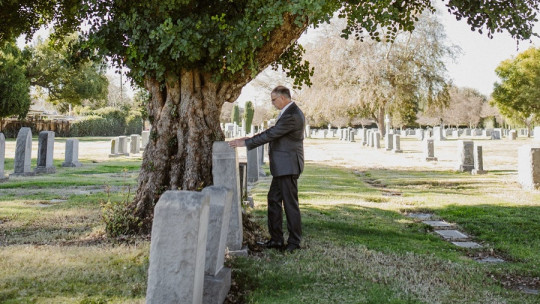Does it happen to you that you tend to go into a loop or do you feel stuck or how everything negative only happens to you? What if you lived in a blocked grief?

“We only heal from pain when we fully suffer it”
Marcel Proust
The overcoming a duel It involves going through all of its 9 stages that Doctor Sellam, a French reference in psychosomatics and basic in my therapeutic support, tells us about. These nine stages, namely, are denial, bargaining, anger, sadness, explanation, understanding, integration, acceptance and reinvestment or reliving or recovering the joy of living with the incorporation of the hidden learning that grief brought us.
What does a blocked duel entail?
When faced with a death, a loss or an abandonment we remain in any of its stages, the grief remains blocked and so does the life of the person who suffers it, in one or more aspects. The loss, unconsciously, is experienced as a desire to follow the person who died, left or abandoned us, feeling like “dead in life“or disconnecting from our own life and its gifts. Different manifestations in the daily life of a locked duel:
- Psychosomatic illnesses or symptoms, impulsivity or hyperactivity (TDHA)
- Avoidant behaviors to avoid feeling pain (drugs or addictions).
- Feeling of guilt towards oneself or towards someone.
- Difficulty or inability to get rid of that person’s objects, having the ashes from the cremation still at home.
- Tendency towards loneliness due to the strong desire to die unconscious.
- Codependency on a person who, for our unconscious, represents the person who left.
- Feeling or believing that you do not have the right to happiness or joy…
What situations can cause blocked grief?
Systemic curiosities, regarding the grief and types of grief that should be closed with therapy:
- Sometimes the pet losses They represent the death or loss or abandonment of other loved ones. This is why they tend to be so painful. Sometimes I also attend to this in consultation, to close the pain or feelings of guilt or sadness or others in the owner, both for the pet and for whoever it represented in the clan with the consequent inner peace, joy of living or the achievement of a dream. profound for the client, after years of insomnia, for example.
- Early death of parents: The death of one of the parents in childhood also has effects on the psyche of the child, who will experience their absence with profound devastating pain and also without the other parent who is also emotionally unavailable or depressed. This absence of references could lead him to experience himself as “lost” throughout his life and as in a continuous external search for authority figures to replace the absent father. We would find here those people who even call themselves eternal “seekers.” When we reconcile with mom and dad in our hearts, we stop searching because we have the internal security that each step nourishes us and that the next one we have to take, along the path, will be revealed to us. According to the self-centering or infantile egocentrism that Piaget points out to us, children are incapable of placing themselves in a point of view other than their own and progressively decenter, allowing them, then, sociability and empathic-assertive communication. And for this reason, as Luz Rodríguez teaches us, when parents die, children blame themselves, believe that they were the cause and live with the feeling of lack of protection and that they too could die. Ultimately, they will grow up with fear, insecurity, and insecure attachment. As if fighting against life or disconnected from it (if it is the death of the mother) or cursing God or with anger towards him (if it is the death of the father). Which can lead to violence or nightmares. Additionally, you may develop a fear of being alone and live in fear that the other parent will abandon you. If he does not know how to manage it, the child may trigger violent behavior in adolescence, begin to repress his feelings or may make him want to become an adult early to support the parent who is present.
- When the father is absent, ignores the child, gives it up for adoption or leaves it in the hands of other relatives, the child will interpret it as an abandonment that for his unconscious will be assimilated to his death. He will interpret it as if that father has died and it is usually very painful for him because he cannot find an explanation and it gives him a feeling that there is something wrong with him for not being able to understand the father’s abandonment. Being able to develop a deep and lonely feeling of not fitting in, like “the ugly duckling” or from a “inadequacy or not fitting in complex”as Virginia Gawel tells us.

- Lonely twin: It is estimated that between 20 and 30% of the gestation of two or more fetuses, only one of them remains alive after the initial phases. On the other hand, let us consider that, sometimes, vaginal bleeding during pregnancy can signal a spontaneous abortion and that the rate of multiple pregnancies is increased by assisted reproduction and the increase in maternal age at pregnancy. According to the clinic, the embryo and placenta are reabsorbed without any symptoms for either the mother or the surviving fetus. However, we observe that, through therapeutic support, the loss of his/her little sister can produce, throughout his/her life, a great feeling of emptiness, loneliness, sadness and even depression.
- The figure of the recumbent: For Dr. Salomón Sellam, abortions, the lost siblings of solitary twins and deaths at an early age are considered by the clan as “unacceptable deaths” or not accepted and therefore generate the Lying Down Syndrome in the family system that remains disconcerted to experience the loss as sudden, unfair and unexpected. And so the birth of the survivors, which was expected to be celebrated with joy, becomes a drama or mourning for everyone.
- You can carry a vicariously blocked duel, that is, in place of one of the parents or ancestors, which results in the fact that in addition to paralyzing the life of the sufferer and preventing them from fulfilling their own goals and dreams, it is egoic or arrogant. From the orders or principles of love we say that it is arrogant because it loses the place of the little ones by erecting itself in the place of the great or by saving them from pain or by invisible loyalty and wanting to continue belonging to the clan.
- Migratory duels: It is also necessary to close them. Migration implies a profound change, physical, psychological, and emotional that affects entire generations. It is necessary to close it and face it with bravery and courage to let go of criticism and victimhood and see and value the opportunities that arise because if not, it will block the achievement of success and prosperity.
If you see yourself represented in any of these cases, the team of psychologists from mundopsicologos.com will be happy to accompany you. Contact us.
How can coming to therapy help you and close your still open grief?
- Being able to see the hidden treasure behind the loss, valuing the positive and the learning it had for you.
- Recovering the joy of living, peace and inner calm.
- Connecting with your life. As well as with the enthusiasm for achieving your dreams and carrying out pleasant activities for you.
- Awakening talents that remained dormant or “dead” due to mourning.
- Experiencing that love between loved ones transcends death.
Every step in the personal growth and development It nourishes and transforms you. Savor them. Savor these advances and achievements in a greater understanding, expression and regulation of your emotions, in conflict management, in a greater empathic-assertive capacity in communication and your social skills, in an adjustment in your self-esteem. As well as increasing your tolerance for frustration, your resilience, and constructive coping and management of change. If you want help with these challenges, psychologists are here for you, to accompany you or help you.








